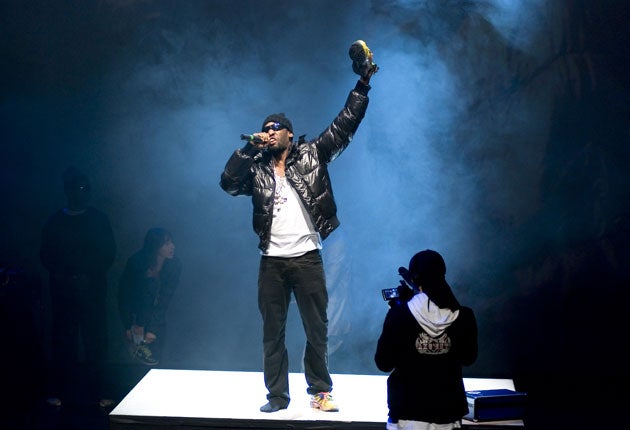Bling doesn't mean a thing: A new play puts hip-hop and its image problems centre stage

Jonzi D has had enough. As one of the pioneers of hip-hop in the UK, he can fondly remember when the genre was more sincere in its artistry, reflecting the core elements of DJing, rapping, breakdancing and graffiti art.
But ever since Sugar Hill Gang's "Rapper's Delight" was marketed as the first mainstream rap record in 1979, a growing number of hip-hop artists have taken commercialism to a new level where it's not uncommon for rappers to endorse products or violence in their lyrics and to prioritise their business model over everything else. "As a lover of hip-hop music, just seeing what's happened over the last 15 years has really been hard for me to take," says Jonzi, now 40. "The way rap has become a product as opposed to a culture; I wanted to do a piece that comments on that."
His new play, Markus the Sadist, is an insightful exploration of this phenomenon, following a talented young rapper who gets caught up in the commercial hip-hop game. "A lot of this production is about the music's desire to come with, in my opinion, genocidal messages, such as 'how many people am I going to merk [murder]?'," he explains. "The question is, why is that form of expression in the fabric of people's minds? I know lots of rappers and most of them are not trying to talk about how many people they can kill."
The production is weighty but wry – the title is inspired by the life of the Marquis de Sade, the French aristocrat known as the "original pornographer", who would, according to Jonzi, be a "nasty, slackness-talking MC" if he was around today. The 24-year-old rapper Bashy plays the lead role, battling over personal integrity and easy money. "This happens to a lot of artists," he says. "It's not as extreme as this, but it's a good metaphor. A lot of artists sell their soul or let go of certain rights that they should really keep."
Brit school alumnus Bashy – real name Ashley Thomas – released his debut album Catch Me If You Can independently in June after years on the pirate circuit, so he can relate to Markus. "I've gone down the path of putting my dreams first and not really caring what's the best thing for me," he says. "When you're a young musician or entertainer coming into this business, sometimes your naivety blinds you – and people exploit that."
Jonzi has been on a mission to educate the masses about hip-hop, with a keenness to marry the genre with theatre, since graduating from the London Contemporary Dance School in 1993. Two years later he developed Lyrikal Fearta, a multimedia production that paved the way for him to tour and produce engaging shows such as Breakin' Convention, London's annual international hip-hop event at Sadler's Wells.
In Markus the Sadist, the majority of the narrative is delivered in rhyme, while rapper/saxophonist Soweto Kinch provides the music. "I wasn't interested in just giving people scripts," says Jonzi. "I wanted people to find things themselves. The lyrics come from the cast."
"I'm very happy with people coming to see the show and being entertained. But my agenda is for people to look at the show and then look at whatever bullshit music video channel they're watching and see through it. It's presenting a very one-dimensional image of mostly young, black people. I'd just like this show to challenge some of the reasons why these images exist."
'Markus the Sadist' opens tonight at Arts Depot, London N12 and tours to 31 October (www.markusthesadist.com)
Join our commenting forum
Join thought-provoking conversations, follow other Independent readers and see their replies
Comments
Bookmark popover
Removed from bookmarks